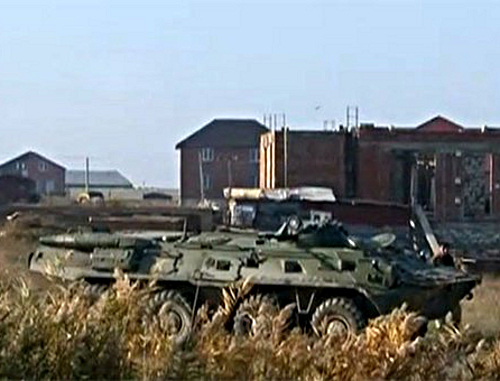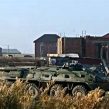
Poor Performance in Makhachkala Suburb Reflects Continuing Flaws in Russian Counter-Insurgency Operations
Publication: Eurasia Daily Monitor Volume: 10 Issue: 58
By:

A special operation in the Makhachkala suburb of Semender that lasted from the morning of March 20 to the evening of March 23 illuminated both a lack of skills in the Russian security services and a lack of control over the situation. It is hard to find another explanation for the fact that several militants held out in a house that was under siege for three days, during which the security services were unable to neutralize them. This is especially odd given the fact that the Russian security services have had more than enough time to gain fighting experience in the North Caucasus.
Attempts to explain away the Russian security services’ poor performance in Semender by claiming that there was a bunker they had to break into are not worthy of serious consideration. The truth is that every house in Dagestan, Chechnya and Ingushetia has a basement that is regarded as an indispensable attribute of a home. The basement is always constructed for mundane purposes, such as storing food and household items that are rarely used. The basement is usually made of concrete because it is the foundation of the house itself at the same time as being a storage space. A pipe or several small windows are normally used to provide fresh air from the outside. So the references to “bunkers” in fact denote basements that are typical for homes in the northeastern Caucasus.
The actions of the security services in Semender were puzzling from the very beginning. First, they besieged the house of the chairman of the Untsukul district council, Magomedkhabib Magomedaliev (www.kavkaz-uzel.ru/articles/221691/). By the evening of March 20, the police figured out that they had been looking for the militants in the wrong house (www.kavkaz-uzel.ru/articles/221695/). The rebels apparently were hiding in the neighboring house, whose owner resides in Moscow. Further, while the security forces were besieging the militants, the latter managed to place a bomb under the car of the Semender administration head (www.riadagestan.ru/news/2013/3/22/153454/). Moreover, the security services sent district council chairman Magomedaliev, to the house with the militants to persuade them to surrender. This caused an uproar among his relatives and friends, who staged a protest demonstration in a central street in Makhachkala, trying to block it with burning tires and attract the attention of republican officials to the events in Semender (www.kavkaz-uzel.ru/articles/221714/). The security services also sent in one of their own serviceman to negotiate with the militants. As a result, five days after the start of the special operation, they could not find either the Dagestani official or their own officer, whom they had sent to talk to the militants.
Having had these difficulties in neutralizing the rebels, the security services spread rumors that sounded completely unbelievable even to a Russian audience, which is used to news sourced to the Federal Security Service (FSB). For example, some media alleged that the rebels had hidden surveillance cameras, which had rendered the government forces’ efforts unsuccessful (https://lifenews.ru/news/112010). The news reports of “hidden cameras” appeared on March 22, which means that the security services’ efforts during the previous two days of the special operation had failed.
The situation at some point became so absurd for the security services that the head of the Russian Investigative Committee, Alexander Bastrykin, flew to Dagestan and held a government meeting on the situation in the republic (www.contrasterra.ru/news/8920). During the meeting it was apparently decided to level the house to the ground.
During the special operation, one officer was killed, six were injured and another reportedly disappeared. Five dead people were found in the house, and it is likely, that the Dagestani official, Magomedkhabib Magomedaliev, was among them. The security services are trying to determine whether the leader of the Gimry militant group, Ibragim Gajidadaev, was among the militants (https://mir24.tv/news/incidentes/6724343). Gajidadev’s death would help the security services save face and receive another set of government awards for a “successful” operation against the militants. Even five days after the special operation, the FSB could not confirm that the leader of Gimry’s militants was in the house (www.bfm.ru/news/211612).
In an attempt to cover up their own mishaps, the government forces decided to blow up the house, on the pretext that they had found three mounted mines inside it (www.riadagestan.ru/news/2013/3/24/153496/). Thus, the government forces literally buried the evidence that would have helped the investigators establish what had actually happened in the house. According to town residents, the officers removed all valuables from the house before it was blown up. In addition, a nearby store was reportedly looted by the government forces during the special operation (www.youtube.com/watch?v=Xjq1dZ3cSwA&feature=youtu.be&a).
As for the rebels, it should be noted that they have little communication between each other. Otherwise, it is hard to explain why rebel news sources simply repeated the Russian news updates in their reporting on the events that took place in Semender. This is another confirmation that all the rebel groups in Dagestan seem to be localized, and that only the emir of each group has contact with a higher-level commander and allows the group to survive and continue its activities even when some of the groups are neutralized. The structure of the Ingush and Chechen jamaats were not set up this way and in turn allowed the Russian security services to penetrate the groups and plant their spies in them, which in turn caused serious damage to the activities of the groups when the spy turned them in.
Experience has shown that Dagestani society is prepared to defend its own representative under any circumstances. The fact that a large protest took place in Makhachkala in defense of Untsukul district official Magomedaliev is testimony to the organizational skills of Dagestanis. The special operation indicated that the republican authorities of Dagestan are entirely deprived of mechanisms to influence the situation during such crises. From March 20 to March 23—the entire duration of the special operation—the republican authorities did not make a single statement, despite the fact that the special operation unfolded in the suburb of Dagestan’s capital. The Dagestani authorities have little power over situations like this, in contrast to the authorities in Chechnya. Moscow’s new protege in Dagestan, Ramzan Abdulatipov, expressed his wish to adopt the Chechen model for the republic (www.yuga.ru/news/290690/).
Thus, in Dagestan we see a clear division between the republican authorities who are excluded from decision making, and those who act on direct orders from Moscow. At this point, Moscow does not seem to be prepared to hand over responsibility for special operations to the Dagestanis themselves, as has happened in Chechnya. The local Dagestani police forces are only used to provide an outer cordon during special operations, which means they are completely distrusted by the Russian special services. With such relations between the Russian and the Dagestani security services, it is hard to expect any significant breakthroughs in the security situation in the republic any time soon.




